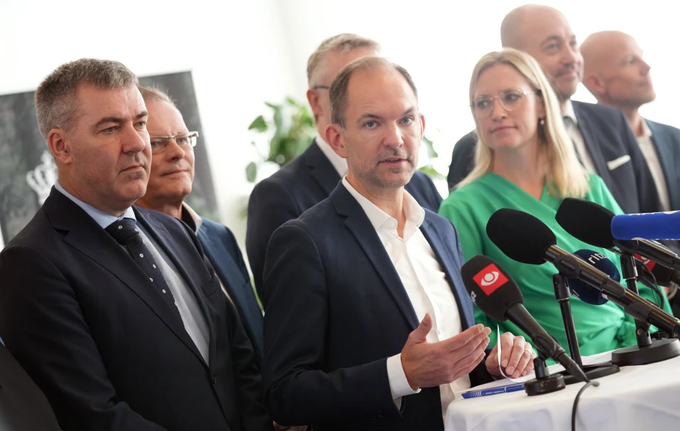November 23, 2025 | 18:30 GMT +7
November 23, 2025 | 18:30 GMT +7
Hotline: 0913.378.918
November 23, 2025 | 18:30 GMT +7
Hotline: 0913.378.918

Denmark’s Minister for the Green Tripartite Jeppe Bruus, center, and members of the coalition present a political agreement on the so-called green tripartite deal at the ministry in Copenhagen, Denmark, Monday, Nov. 18, 2024.
The government called the agreement “the biggest change to the Danish landscape in over 100 years.”
“The Danish nature will change in a way we have not seen since the wetlands were drained in 1864,” said Jeppe Bruus, head of Denmark’s Green Tripartite Ministry, created to implement a green deal reached in June among farmers, the industry, the labor unions and environmental groups.
Under the agreement, 43 billion kroner ($6.1 billion) have been earmarked to acquire land from farmers over the next two decades, the government said.
Danish forests would grow on an additional 250,000 hectares (618,000 acres), and another 140,000 hectares (346,000 acres), which are currently cultivated on climate-damaging low-lying soils, must be converted to nature. Currently, 14.6% of land is covered by forests.
The deal was reached by the three-party Danish government — made up of the Social Democrats, the Liberals and the center Moderates — and the Socialist People’s Party, the Conservatives, Liberal Alliance and the Social Liberal Party.
A vote in parliament on the deal is considered a formality.
In June, the government said livestock farmers will be taxed for the greenhouse gases emitted by their cows, sheep and pigs from 2030, the first country to do so as it targets a major source of methane emissions, one of the most potent gases contributing to global warming.
(AP)
/2025/11/22/4018-4-213342_747.jpg)
(VAN) The Mekong Delta Agricultural Experts Club has attracted 143 experts and researchers to participate in providing consultancy and contributing initiatives to the development of one million hectares of high-quality rice.

(VAN) Ca Mau’s development of OCOP products opens a path to increasing cooperatives value, helping boost income, expand markets, and affirm collective economy's role.

(VAN) Turning seemingly ordinary coconut shells into unique jewelry and artwork, Nguyen Bang Nhi spreads the value of local culture through her brand, Cocohand.

(VAN) Results from the Sustainable Durian Model Project in Dak Lak have confirmed the critical role of Yara Viet Nam in transferring advanced nutritional solutions to farmers.

(VAN) In Tuyen Quang province, livestock farmers have introduced effective models and innovative practices that significantly strengthen African Swine Fever prevention and control efforts.

(VAN) This is the study conducted by IRRI and Can Tho University on the rice straw value chain in Mekong Delta showing an economic potential of more than 6.6 trillion VND/year.

(VAN) By participating in cooperative economics, many farmers in Tay Ninh have overcome hardship, mastered clean dragon fruit cultivation techniques.